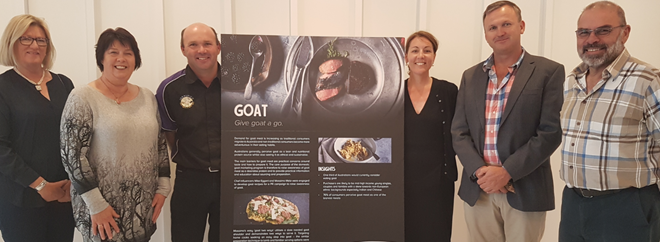Know your representatives
12 February 2019
Just as Australia's sheep and cattle industries have peak industry councils to represent their views and interests, so does the goat industry. Under its charter as a Commodity Council, the Goat Industry Council of Australia (GICA) has the role of developing collective goat industry policy, across all breeds by working with government, industry bodies, producers and other peak industry councils to this end. GICA’s purpose is to:
- Function as an industry organisation to represent and promote the interests of Australian goat producers.
- Carry out activities to advance the goat industry and collect and disseminate relevant information.
- Liaise and cooperate with its members, relevant government departments and authorities at local, state and federal levels and with other relevant industry organisations.
- Promote the development of the agricultural and pastoral industries of Australia.
 |
| L-R: Fiona McLeod, Kaylene Baird, John Falkenhagen, Katie Davies, Campbell McPhee and Peter Lauterbach. (Sue Davey absent). |
Membership
Presently, GICA has two membership levels:
- Full members – State Farmer Organisations (SFOs) and four commodity based members: dairy, meat, fibre and rangeland; and
- Associate member – Australian Meat Industry Council (AMIC) (this is also open to other industry participates such as traders, goat product manufacturers and associated industries).
The role of full members whether elected by SFOs or representing a commodity, is to perform two way communication regarding state, commodity and national goat industry issues (between their SFO/commodity group (and by default the goat producer members of that SFO/commodity group) and GICA). They bring knowledge and experience to assist in developing and influencing policies.
The addition of the membership type of ‘commodity’ was made to the GICA constitution in November 2018 and the intention is that these members will represent specific sectors of the industry such as dairy or fibre.
The current members of the council can be found here. GICA is funded from membership fees paid by full and associate members and from an industry allocation by the Red Meat Advisory Council (RMAC).
Who are your representatives on GICA?
As of November 2018, the GICA President is John Falkenhagen. John, and his wife Bec, run a goat dairy near Meningie, SA, with approximately 1,200 registered dairy goats. They milk about 450 year-round and kid about 650 a year with synchro programs every eight weeks. To read more about John and Bec’s operation: https://www.mla.com.au/news-and-events/industry-news/case-study-pushing-the-boundaries/
Also as of November 2018 GICA’s Vice President is Katie Davies, who was elected by NSW Farmers and also acts as the NSW Farmers Goat Committee chair. Katie and her husband Ed run a rangeland harvesting operation near Wilcannia, NSW, and recently expanded to purchase a property in cropping country to more consistently finish off their rangeland goats for market. She writes a regular goat focused column for The Land newspaper and has in the past featured on the ABC’s Landline program promoting the industry.
Peter Lauterbach was elected by Livestock SA to sit on GICA and for a number of years has acted as Treasurer. Until recently, Peter operated a farm at Peake, SA, with a cropping and goatmeat focus. Initially Peter started with cashmere goats and following a fall in goat fibre prices in the early 2000s shifted focus from fibre to goatmeat by introducing Boer genetics. To read more about Peter’s operation: https://www.mla.com.au/news-and-events/industry-news/herbicide-costs-slashed-by-goat-herd/
The Victorian Farmers Federation (VFF) elected representative is Kaylene Baird. Kaylene and her husband Bill operate a small goatmeat property near Hillcrest, Victoria. In the past breeding Boer does were exported live to Malaysia and America. Cull animals and wethers are contract killed through Hardwicks and supplied to butchers in the Ballarat region. To read more about Kaylene and Bill’s operation: https://www.mla.com.au/news-and-events/industry-news/choosing-goats-a-healthy-option/
Present commodity members include Fiona McLeod representing Rangeland - Pastoralists' Association of West Darling (PAWD) and Sue Davey representing Dairy - Dairy Goat Society of Australia (DGSA).
Fiona and her husband Andy operate a rangeland goatmeat business south of Broken Hill NSW. They also run Merinos and Dorpers and are passionate about the control of wild dogs in the area. To read more about Fiona and Andy’s operation: http://www.rangelandgoats.com.au/infrastructure/case-study/case-study-fiona-and-andy-mcleod
Sue Davey only recently joined GICA and is the Federal President for DGSA. Sue and her partner Steve operate a small stud, breeding pedigree Saanen dairy goats near Lachlan, Tasmania. Their aim is to breed a dairy goat that is productive with good confirmation carrying an udder that is capacious and is strongly attached as these attributes contribute to longevity and profitability.
Lastly, Campbell McPhee from Western Meat Exporters acts as the representative for the Australian Meat Industry Council (AMIC) and provides valuable input into issues relating to processing and meat exports. To learn more about Western Meat Exporters: https://www.westernmeatexporters.com.au/ or AMIC https://amic.org.au/
If you’d like to know more about GICA and get in touch with your local representative, please follow this link: http://www.gica.com.au/home


